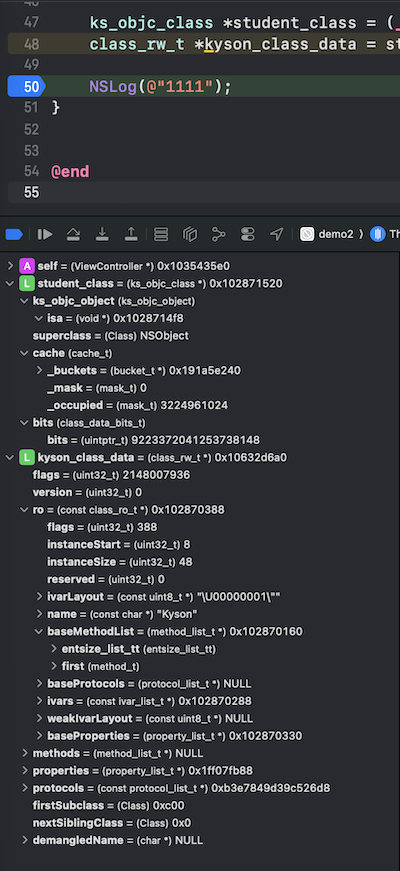前言
我们知道,OC 对象本质上是 C 语言结构体。那么 OC 对象转化成 C 语言底层是怎样的?今天我们就来盘一盘。
工具
借助 KSClassInfo.h :
#import <Foundation/Foundation.h>
#ifndef KSClassInfo_h
#define KSClassInfo_h
# if __arm64__
# define ISA_MASK 0x0000000ffffffff8ULL
# elif __x86_64__
# define ISA_MASK 0x00007ffffffffff8ULL
# endif
#if __LP64__
typedef uint32_t mask_t;
#else
typedef uint16_t mask_t;
#endif
typedef uintptr_t cache_key_t;
struct bucket_t {
cache_key_t _key;
IMP _imp;
};
struct cache_t {
bucket_t *_buckets;
mask_t _mask;
mask_t _occupied;
};
struct entsize_list_tt {
uint32_t entsizeAndFlags;
uint32_t count;
};
struct method_t {
SEL name;
const char *types;
IMP imp;
};
struct method_list_t : entsize_list_tt {
method_t first;
};
struct ivar_t {
int32_t *offset;
const char *name;
const char *type;
uint32_t alignment_raw;
uint32_t size;
};
struct ivar_list_t : entsize_list_tt {
ivar_t first;
};
struct property_t {
const char *name;
const char *attributes;
};
struct property_list_t : entsize_list_tt {
property_t first;
};
struct chained_property_list {
chained_property_list *next;
uint32_t count;
property_t list[0];
};
typedef uintptr_t protocol_ref_t;
struct protocol_list_t {
uintptr_t count;
protocol_ref_t list[0];
};
struct class_ro_t {
uint32_t flags;
uint32_t instanceStart;
uint32_t instanceSize; // instance对象占用的内存空间
#ifdef __LP64__
uint32_t reserved;
#endif
const uint8_t * ivarLayout;
const char * name; // 类名
method_list_t * baseMethodList;
protocol_list_t * baseProtocols;
const ivar_list_t * ivars; // 成员变量列表
const uint8_t * weakIvarLayout;
property_list_t *baseProperties;
};
struct class_rw_t {
uint32_t flags;
uint32_t version;
const class_ro_t *ro;
method_list_t * methods; // 方法列表
property_list_t *properties; // 属性列表
const protocol_list_t * protocols; // 协议列表
Class firstSubclass;
Class nextSiblingClass;
char *demangledName;
};
#define FAST_DATA_MASK 0x00007ffffffffff8UL
struct class_data_bits_t {
uintptr_t bits;
public:
class_rw_t* data() {
return (class_rw_t *)(bits & FAST_DATA_MASK);
}
};
/* OC对象 */
struct ks_objc_object {
void *isa;
};
/* 类对象 */
struct ks_objc_class : ks_objc_object {
Class superclass;
cache_t cache;
class_data_bits_t bits;
public:
class_rw_t* data() {
return bits.data();
}
ks_objc_class* metaClass() {
return (ks_objc_class *)((long long)isa & ISA_MASK);
}
};
#endif /* KSClassInfo_h */
开始窥探
然后在 view controller 中窥探:
#import "ViewController.h"
#import "KSClassInfo.h"
#import <objc/runtime.h>
@interface Kyson : NSObject
@property (nonatomic, copy) NSString *sex;
@property (nonatomic) NSInteger age;
@property (nonatomic) NSInteger height;
@property (nonatomic, copy) NSString *tel;
@property (nonatomic, copy) NSString *IDNumber;
-(void) doSomething;
@end
@implementation Kyson
-(void) doSomething {
NSLog(@"%s==%@",__func__,self);
}
@end
@interface ViewController ()
@end
@implementation ViewController
- (void)viewDidLoad {
[super viewDidLoad];
// Do any additional setup after loading the view.
ks_objc_class *student_class = (__bridge ks_objc_class *) [Kyson class];
class_rw_t *kyson_class_data = student_class->data();
NSLog(@"1111");
}
@end可以看到 C 语言层面的信息一览无余:

果博东方客服开户联系方式【182-8836-2750—】?薇- cxs20250806】
果博东方公司客服电话联系方式【182-8836-2750—】?薇- cxs20250806】
果博东方开户流程【182-8836-2750—】?薇- cxs20250806】
果博东方客服怎么联系【182-8836-2750—】?薇- cxs20250806】